The Smithsonian Institution, in building a showcase on the history of brewing, came calling on Professor Emeritus Michael J. Lewis.
Of course it did. He’s a legend in American brewing. A scientist and educator at UC Davis for nearly 60 years, he’s trained and mentored multiple generations of brewers and influenced the industry’s shift to craft beers.
FROM DAVIS TO D.C.

On a display placard titled “The Professor,” the museum states: “Biochemist Michael Lewis, an expert on the properties of yeast in brewing, arrived at the University of California at Davis in 1962. The university’s center for the study of winemaking was world-renowned, but its brewing science program was just beginning. Lewis built Davis’ program into a premier center for the study of brewing and became the nation’s first professor of brewing science. Generations of brewers passed through his classroom.”
The history ends with his photo and a quote: “My business is to teach the bedrock, to teach what every brewer must know in spades.”
He’s taught from a textbook titled Brewing, which he co-authored with Tom W. Young of the University of Birmingham (England), and Lewis gave his “much used, beat-up” copy to the Smithsonian. He also gave an oral history to Theresa McCulla, curator of the showcase, “Brewing a Revolution.”
The showcase is within the permanent exhibition “FOOD: Transforming the American Table, 1950-2000,” in the Smithsonian’s National Museum of American History. The exhibition reopened Oct. 25 with “Brewing a Revolution” and three other new showcases.

This Friday (Nov. 8), Lewis, the nation’s first professor of brewing science, will be among “several of the most transformational figures in the beer industry,” as described by the Smithsonian, who will participate in a panel to reflect on the past, present and future of beer.
The panel and tasting event are part of Smithsonian Food History Weekend, Nov. 7-9. Lewis will be accompanied by his wife, Sheila, and their three children and their spouses.
“I am so very honored to have a role in this Smithsonian project, and to draw attention to our UC Davis brewing program,” Lewis said. “We built a program that has matured and continues to serve the industry, making us as relevant today as we were in 1964.”
He joined UC Davis as a postdoctoral researcher in 1962 and two years later, with a faculty appointment, began to transform the university’s nascent brewing program into a comprehensive course of study with a worldwide reputation of excellence.
Joining him on the panel: Ken Grossman, founder of Sierra Nevada Brewing Co.; Fritz Maytag, former owner of San Francisco’s Anchor Brewing Co.; and Charlie Papazian, founder of the American Homebrewers Association and a past president of the Brewers Association of small and independent craft brewers.
Honored for his teaching

Lewis originated the first formal brewing courses at an American university, Food Science and Technology 102A (lecture) and 102B (lab), and, with Professor Vern Singleton of the Department of Viticulture and Enology, developed the first fermentation science major in the country and now duplicated in many places.
In 1989, the Davis Division of the Academic Senate honored Lewis for distinguished teaching at the undergraduate level. “It is the award I am most proud of,” he said.
Under his leadership, the brewing program emphasized yeast fermentation science and the study of the complex processes involved in converting malted barley and hops into beer.
He is still teaching in UC Davis Continuing and Professional Education, which was known as University Extension when Lewis established its professional brewing programs around 1970.
Besides giving his textbook to “Brewing a Revolution,” he also gave handouts for home-brew classes (“home brew is considered the mother lode of craft brewing”), and a photo from the mid-1970s of him and his brewing lab class in Sonoma, at New Albion Brewing Co., the first microbrewery in the United States.

Advice and authentic ale yeast
“My introduction to the craft beer concept arose when (New Albion’s) Jack McAuliffe visited me to discuss his vision for making British-style ales using ale-making technology,” Lewis wrote in an autobiography. “As that was my training and wheelhouse, I instantly understood what he was talking about and was excited by his ideas.
RELATED CONTENT
“Thus I was able to help establish the first from-the-ground-up craft brewery in America. Apart from advice, we provided Jack with his first employee (Don Barkley) and an authentic ale yeast from (what is now) the H.J. Phaff Yeast Culture Collection.”
Lewis took emeritus status in 1995 after 30 years in the Department of Food Science and Technology, but filled in as the brewing instructor until 1998, and he stayed on with Continuing and Professional Education, or CPE. He stepped down as CPE’s academic director and lead instructor in August 2018.
“When I came to Davis in 1962, I never thought I would have the opportunity to establish a brewing educational program that would have such longevity and impact,” Lewis said last year upon announcing that he would scale back his duties. “But that’s UC Davis for you!”
He earned bachelor’s and doctoral degrees in biochemistry from the University of Birmingham, England, in 1957 and 1960. He has authored more than 100 scholarly papers, and received multiple national and international honors, including: Master Brewers Association of the Americas’ Award of Merit and the Brewers Association’s Recognition Award, elected fellow of the Institute of Brewing and Distilling, and life member of the American Society of Brewing Chemists and Master Brewers Association of the Americas.
Lewis lives in Davis and has written a column titled “A Point of Brew” for The Davis Enterprise for 25 years.
Media Resources
Dave Jones, 530-752-6556, dljones@ucdavis.edu
